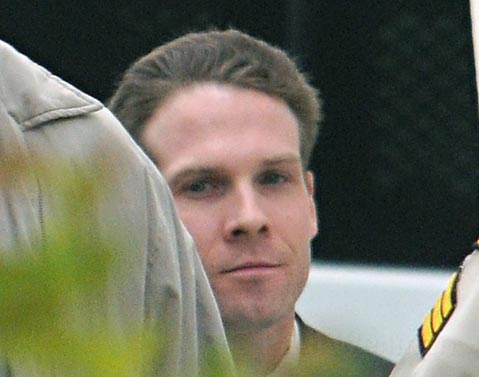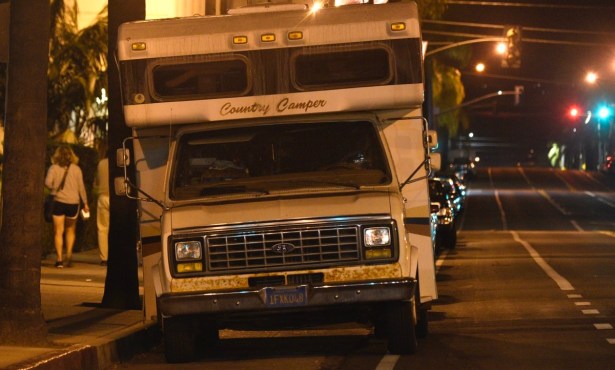Court Hears Appeal of Hollywood Murder Conviction
Attorney Argues There Were Two Separate Kidnappings

With the victim’s mother and father watching from the front row, an attorney for Jesse James Hollywood — convicted in the 2000 murder of 15-year-old Nick Markowitz — argued in front of a panel of the California Court of Appeal last week that the conviction should be overturned.
Though not present at the time Markowitz was shot to death by Ryan Hoyt near Lizard’s Mouth in the hills above Santa Barbara, Hollywood was convicted in 2009 under the felony murder rule — that is, when a person is killed during the commission of another felony, all those involved in that felony can be liable for the murder.
Hollywood, in testifying during his own trial, admitted to being involved in the original kidnapping of Markowitz. The boy had been out walking in West Hills in the San Fernando Valley — where both Hollywood and Markowitz lived at the time — when Hollywood and some of his buddies came across the 15-year-old.
Hollywood had been feuding with Markowitz’s older brother, Ben, who had an outstanding drug debt he owed to Hollywood, according to testimony at the trial. Hollywood and others he was with roughed up Nicholas Markowitz and threw him in the car, taking him with them on a trip to Santa Barbara for Fiesta.
But Hollywood’s attorney is arguing that there were actually two separate kidnappings in the events leading up to Markowitz’s death. “This is a complicated case,” Goleta-based attorney Ralph Goldsen told the three-judge panel Thursday afternoon in Ventura.
Once in Santa Barbara, Hollywood maintained, the kidnapping was over and Nick was free to go. It’s an intriguing explanation. Several witnesses testified to partying with Nick, that he was smoking marijuana, playing video games, and drinking beer — sometimes with Hollywood — and when told he should leave, declined. Hollywood testified that he himself asked the teen if he wanted to go home, to which Markowitz replied, “No, it’s cool.” Hollywood was not present during much of Markowitz’s time in Santa Barbara.
“Nick’s apparent consent to remain in Santa Barbara was the defense upon which [Hollywood] was actually relying,” Goldsen wrote in his brief. “It was a defense supported by ample, overwhelming evidence. Virtually every third party, and [Hollywood] himself, testified that they believed Nick was consenting to stay in Santa Barbara.”
Goldsen said in his arguments Thursday that a second, separate kidnapping occurred the night Markowitz was killed. Markowitz was in a hotel room with Jesse Rugge and Graham Pressley, when Hoyt arrived with a duffel bag. Hollywood — who was having dinner with his girlfriend in the L.A. area at the time — testified he had given instructions to Hoyt to bring the boy home. But Hoyt took Pressley to Lizard’s Mouth, made him dig a hole, and returned to the Lemon Tree Inn. There the two picked up Rugge and Markowitz and returned to Lizard’s Mouth, where Hoyt shot the boy. This all took place, Goldsen contends, without Hollywood’s knowledge.
The first kidnapping — the one Hollywood had participated in, Goldsen said — had terminated, thus cutting off his liability. Hollywood is further distanced because Hoyt could not be considered a co-felon in the first kidnapping (he was not present), Goldsen claims.
But David Glassman, an attorney with the Attorney General’s office, said that Hoyt killed Markowitz at Hollywood’s direction. “It’s ludicrous to assert when Mr. Hoyt shows up ready to kill that is an idea that sprang up from his own mind independently,” Glassman said. There are many ways to look at the evidence, Glassman asserted, but “virtually all of them are incriminating.”
“If a juror decided under the facts of this case the kidnapping ended and a new one started, it could still end up in conviction,” he said.
At appeal, the case isn’t re-litigated, but the court looks to see if there was sufficient evidence to support the jury’s decision. A juror interviewed by The Santa Barbara Independent shortly after the trial said, “Jesse James Hollywood was responsible from when Nick was put into the van to his death.”
This is the second time Hollywood’s case has been in front of the Court of Appeal. The court also deliberated over whether prosecutor Ron Zonen should have been taken off the case for assisting producers of the major motion picture Alpha Dog, which starred Justin Timberlake and Emile Hirsch. The case eventually made its way to the state Supreme Court, which ruled that while Zonen should’ve proceeded with more caution in helping out with the movie, he shouldn’t be taken off the case. (Zonen did so, he said, to increase publicity about the case, as Hollywood hadn’t been captured at the time. Hollywood wasn’t arrested until 2005, when he was tracked down in a small Brazilian fishing town. Zonen was taken off the case by then-DA Christie Stanley.)
Hollywood, now 32, is currently serving his sentence in Calipatria State Prison. Rugge — convicted of aggravated kidnapping — is eligible for parole, but it was denied his last time in front of the parole board, which noted he had made steps in rehabilitating himself but not enough to be freed. Hoyt is on Death Row at San Quentin State Prison, awaiting his appeal to be heard. Pressley was sentenced as a juvenile and is now free.
The justices will have 90 days to issue a decision. Their opinion can be appealed to the California Supreme Court, but the likelihood of the state’s high court of hearing the case is small.



